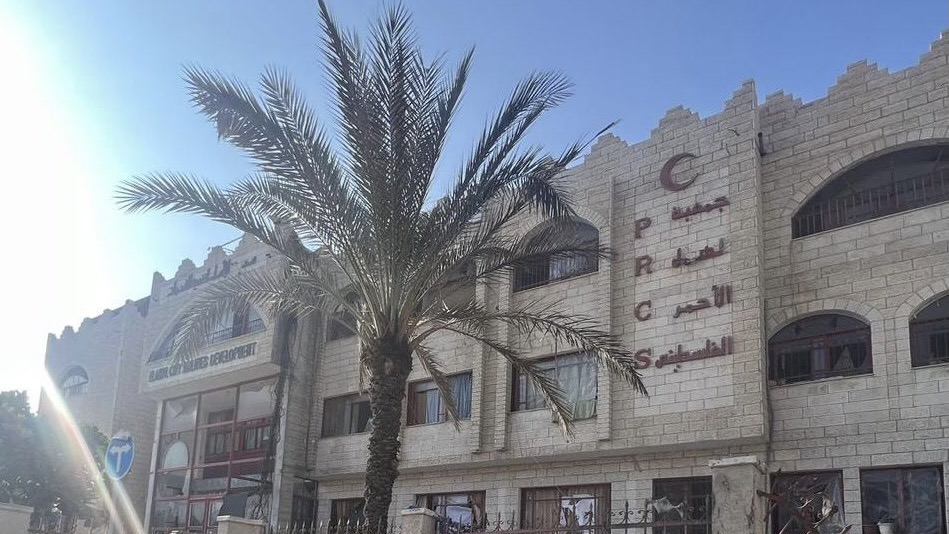Israel continues its attacks on Al-Amal Hospital and Nasser Hospital in Khan Younis, despite having already decimated the capacity for care provision at the two facilities. Over the past weeks, most of the people who had taken shelter at Nasser were violently expelled, including health workers and their families. On February 16, the Israeli invasion into Nasser caused an electricity outage and led to the death of several patients still kept in the intensive care unit. Experts warn that more are likely to meet the same fate if they are not transferred soon.
Representatives of the World Health Organization (WHO), which has been trying to negotiate the transfer with the Israeli Occupying Forces (IOF), said they were denied entry into Nasser on multiple occasions until February 19. The UN health agency also announced that the round of attacks on Nasser Hospitals has brought the number of partly functional hospitals in Gaza to 11 from the original 36.
Read more: Israeli forces escalate siege on Nasser hospital, several patients killed
During the IOF raid of Nasser Hospital, they also continued bombardments around Al-Amal Hospital, which is affiliated with the Palestine Red Crescent Society (PRCS). On Sunday February 18, the PRCS announced that Israeli forces had hit the hospital building itself, causing serious damage.
The organization also published material documenting the treatment of members of its staff who were kidnapped by the IOF during a raid on February 9. Two of the physicians, Jamal Ayad and Nafith Al-Qarm, were recently released, however photographs shared by the PRCS show that their knees, wrists, and faces were wounded during their detention.
As some of the health workers who were kidnapped by Israeli forces during hospital raids in the past four months are released, more testimonies have emerged of the severe torture and violence they faced whilst in Israeli detention.
One of them, Dr. Alaa Muti’ Al-Ghafir from Al-Shifa’s radiology department, was held captive by the Israeli forces for 56 days. During this time, he recounts, he was beaten so severely he required stitches to stop the bleeding. Al-Ghafir was held in a barrack with approximately 120 more people, without access to adequate hygiene standards or even enough food and water.
“We were given one glass of water per day. We were all hungry and thirsty all day long,” he said in a testimony published by the People’s Health Movement (PHM). “Every day, we had to wake up at 5:00 am and were forced to sit on our knees until midnight. If we moved, we were thrown against the barracks’ fence, and we were not allowed to use the restroom unless the soldier agreed.”
According to reports from the Palestinian Ministry of Health, some 70 staff members from Nasser Hospital were taken by Israeli soldiers after the latest raid, including Atef Al-Hout, the hospital director, and head of surgery Naheed Abu Taaimah.
Read more: Palestinian health workers kidnapped by Israel subjected to torture and humiliation
The intensification of attacks against healthcare in Khan Younis indicates that the few health establishments in Rafah will not be spared when the ground offensive moves there. There are no hospitals in Rafah that could effectively help absorb all the displaced patients coming from other parts of Gaza, but the health facilities there play essential roles in the provision of care in Gaza.
Among them is the Al-Helal Al-Emirati Maternity Hospital, whose health staff have been struggling to keep up with the effects of the war. The position of women and children in the war continues to be particularly vulnerable, as mothers are not able to initiate breastfeeding as they are going hungry themselves.
About two months into the Israeli war on Gaza, Mohammed Salama, head of the neonatal ICU at the hospital, was already warning of a shortage of essential medical supplies, equipment, and formula needed to provide care to newborns. The situation has only grown worse since then, as the aid being allowed into Gaza continues to be a drop in the ocean compared to actual needs.
Emirati’s incubators continue to host several children at the same time, increasing the risk of sepsis. By February 15, 77 babies were sharing 20 incubators. Children in good condition are discharged from the ward, but health workers “know that after a few days they will come back either with sepsis or with hypothermia,” Salama recently told UN officials visiting the facility.
People’s Health Dispatch is a fortnightly bulletin published by the People’s Health Movement and Peoples Dispatch. For more articles and to subscribe to People’s Health Dispatch, click here.





